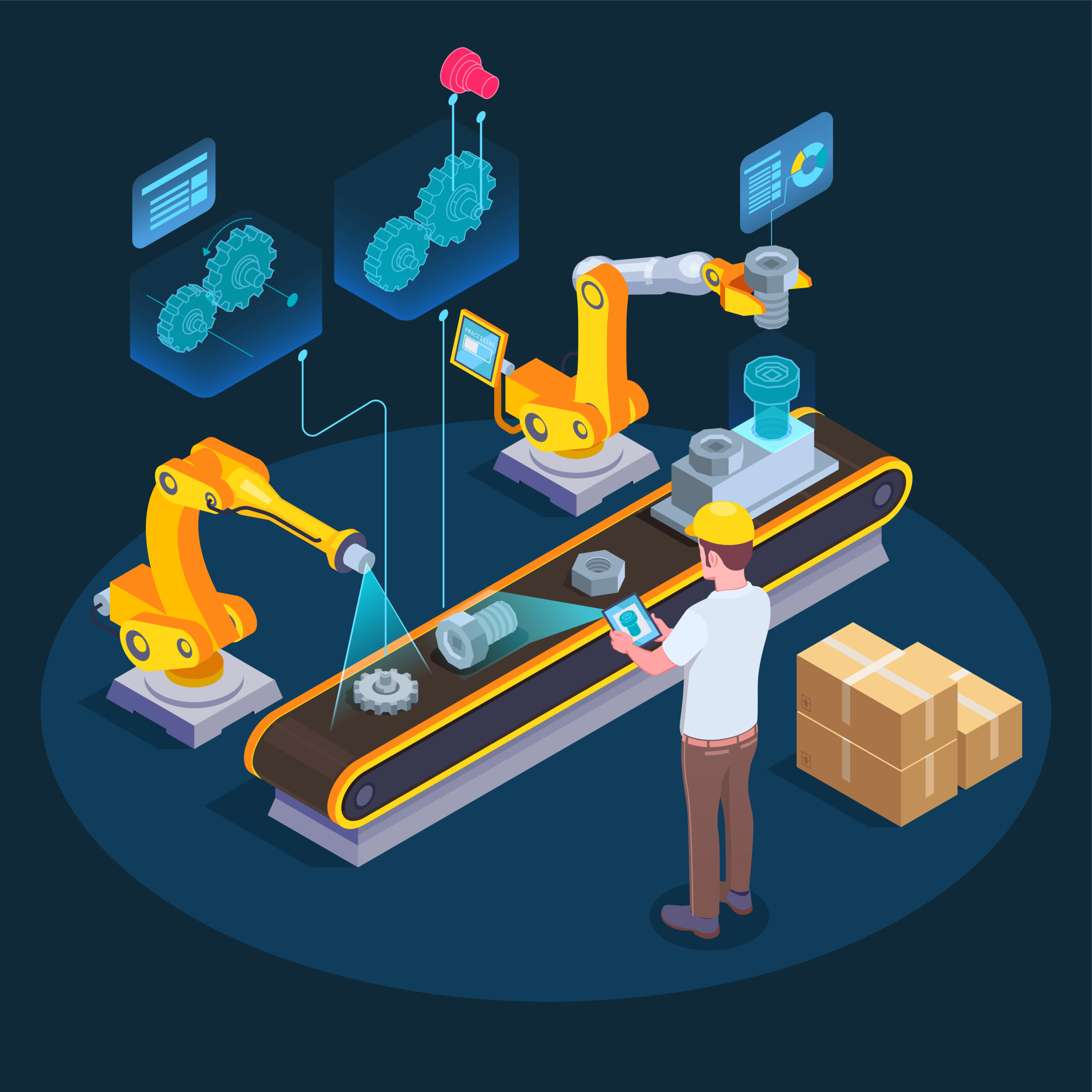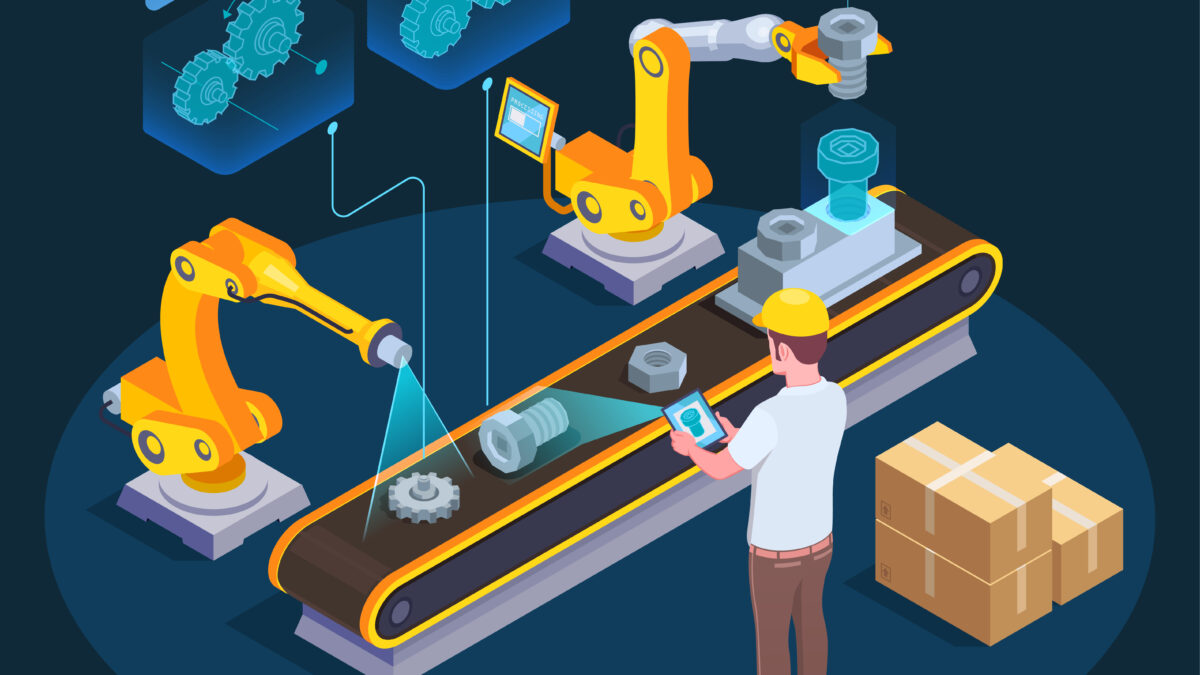
Introduction
In the rapidly evolving landscape of manufacturing, Artificial Intelligence (AI) stands as a game-changer, reshaping industries like clothes manufacturing, furniture manufacturing, automotive manufacturing, and more. In this comprehensive guide, we delve into the profound impact of AI on these sectors. We’ll explore how AI-driven solutions are optimizing processes, enhancing efficiency, and fostering innovation. Join us on this journey to uncover the transformative power of AI in the manufacturing industry.
Why It Is Important for the Manufacturing Industry
AI holds immense significance for the manufacturing sector due to its potential to enhance efficiency, reduce costs, and drive innovation. It enables manufacturers to stay competitive and adapt to the ever-evolving industry landscape.
Syndell is a leading Digital Transformation Company specializing in AI ML development services for manufacturing industries. We are committed to helping manufacturers harness the power of AI to improve their operations and achieve their business goals.
Understanding AI in Manufacturing
AI involves using algorithms and machines to mimic human cognitive functions. In manufacturing, it’s applied for automation, predictive maintenance, quality control, and supply chain optimization, among other functions.
AI advancements include robotics in production lines, predictive maintenance using IoT sensors, and machine learning algorithms for quality control. AI is transforming the manufacturing landscape.
According to industry reports, the global AI in the manufacturing market is expected to grow significantly. By 2025, it’s estimated to be worth billions of dollars, underscoring the potential of AI in the manufacturing sector.
Read More About What is Artificial Intelligence and Role of Natural Language Processing (NLP) in AI
The Benefits of Implementing AI in Manufacturing
The implementation of AI in manufacturing processes brings several significant benefits. Firstly, AI-driven systems can gather and analyze vast amounts of data in real time, enabling manufacturers to make informed decisions quickly. This data-driven approach improves operational efficiency, reduces downtime, and enhances productivity.
Furthermore, AI can automate repetitive and mundane tasks, freeing up human resources to focus on more complex and strategic activities. AI-powered systems can also identify patterns and anomalies in data, helping manufacturers detect faults or issues before they lead to downtime or product defects.
AI Applications in Clothes Manufacturing
The application of AI in clothes manufacturing has transformed the industry, streamlining processes and enhancing quality control. AI technologies, such as machine vision, can accurately identify fabric flaws, ensuring that only pristine materials are used. This improves product quality while reducing waste.
-
Optimized Production Planning:
AI is transforming clothes manufacturing by streamlining production planning. Machine learning algorithms analyze historical data and current trends to predict demand, helping manufacturers plan their production more efficiently.
-
Enhanced Quality Control:
Quality control in clothing production has improved with AI. Computer vision and machine learning systems inspect fabrics for defects and ensure consistent quality, reducing the need for manual inspection.
-
Smart Inventory Management:
AI algorithms, as seen in the case of Colorhunt, analyze sales data and trends to optimize inventory levels. This results in reduced overstock or understock situations, leading to cost savings and improved customer satisfaction.
-
Personalized Customer Recommendations:
AI enables clothing brands to provide personalized recommendations to customers based on their preferences. This leads to enhanced customer satisfaction and increased sales.
For instance, Our Case Study of the clothing manufacturing industry, Colorhunt Clothing, utilizes AI algorithms to analyze fashion trends, predict demand, and optimize inventory levels. AI also enables personalized recommendations for customers based on their preferences, resulting in enhanced customer satisfaction and increased sales.
Read More About The Future of Software Product Development Using AI Technology
AI Applications in Furniture Manufacturing
AI is also making waves in the furniture manufacturing industry.
-
Customized Designs:
AI can assist furniture manufacturers in creating customized designs. Machine learning algorithms can generate design options based on customer preferences, streamlining the design process.
-
Efficient Production Planning:
AI optimizes production planning, reducing waste and optimizing material utilization. This leads to cost savings and eco-friendly practices.
-
Enhanced Supply Chain Management:
AI-driven supply chain management ensures timely sourcing of materials and components, reducing delays and bottlenecks in production.
Our Case Study of the furniture manufacturing industry, Highgrove Beds, leverages AI algorithms to assist with design and material selection, ensuring that their products meet customer expectations. AI also enables efficient production planning, reducing waste and optimizing material utilization. Through the integration of AI, furniture manufacturers can meet the demands of a diverse customer base while maximizing operational efficiency.
Read More About Top Applications of NLP Across Industries: A Comprehensive Guide
AI Applications in Automotive Manufacturing
-
Robotics and Automation:
AI-powered robots are revolutionizing automotive assembly lines. These robots can perform repetitive tasks with precision, increasing efficiency and reducing production errors.
-
Predictive Maintenance:
AI algorithms monitor machinery performance and predict maintenance requirements. This minimizes downtime, ensuring uninterrupted production and optimal output.
-
Supply Chain Optimization:
AI helps in optimizing supply chains by predicting demand, improving inventory management, and ensuring just-in-time delivery of components.
Read More About How to Build A Smart Home Automation Software App
AI Applications in Textile Manufacturing
-
Process Efficiency:
In textile manufacturing, AI optimizes production processes by analyzing complex chemical reactions in real time. This leads to improved efficiency and higher-quality products.
-
Quality Control:
AI can detect and prevent defects in fabrics during the manufacturing process. This not only ensures product quality but also leads to cost savings and improved customer satisfaction.
-
Cost Reduction:
By reducing waste and improving process efficiency, AI helps minimize production costs in chemical and textile manufacturing.
AI applications are transforming various sectors of the manufacturing industry, including clothes manufacturing, furniture manufacturing, automotive manufacturing, textile manufacturing, and chemical manufacturing.
These advancements are enhancing efficiency, quality control, and overall productivity, making AI integration a key factor for manufacturers to stay competitive in today’s rapidly evolving landscape. Companies like Colorhunt, Highgrove, and others are at the forefront of embracing AI, showcasing its potential to revolutionize their respective industries.
Read More About How AI is Transforming the Future of Web Development
Conclusion
AI is a game-changer in the manufacturing industry, improving efficiency, quality, and cost-effectiveness. Embracing AI is essential for staying competitive in the global market. Syndell is a leading AI ML development Company in the USA, UK, Canada, Australia, UAE, and Nigeria, offering tailored solutions to manufacturers across various sectors, helping them harness the power of AI for growth and innovation.
Whether you need to hire full stack developers for technologies like ReactJS development services, NodeJS development services, VueJS development services, or AngularJS development services, we’ve got you covered.
Manufacturers are encouraged to adopt AI and partner with Syndell to stay at the forefront of innovation and remain competitive in the ever-evolving manufacturing landscape. Embrace AI to unlock your full potential.
So, if you’re looking to harness the potential of AI in the Manufacturing Industry, don’t hesitate to Contact Us. It’s time to embrace the future with technology and expertise by your side.
FAQs
What is AI, and how is it applied in manufacturing?
Artificial Intelligence (AI) refers to the simulation of human intelligence in machines. In manufacturing, AI is applied to automate processes, optimize production planning, improve quality control, and enhance predictive maintenance, among other functions.
What are the advantages of using AI in the manufacturing industry?
AI offers several benefits in manufacturing, including cost reduction, improved quality control, increased production efficiency, predictive maintenance, and enhanced supply chain management. These advantages contribute to competitiveness and innovation.
What are the applications of AI in manufacturing?
AI applications in manufacturing include optimizing production planning, improving quality control, predictive maintenance, and enhancing supply chain management.
How AI will affect the manufacturing industry?
AI will revolutionize the manufacturing industry by increasing efficiency, reducing costs, and improving product quality.
How can AI improve inventory management in manufacturing?
AI enhances inventory management by using real-time data and predictive analytics to optimize stock levels. It ensures that materials are available when needed, minimizes excess inventory, and reduces carrying costs, contributing to cost savings and operational efficiency.


